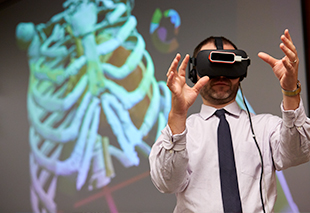Leading the Way in Digital Experience Technology

Over the past five years, the use of digital experience technology has grown drastically. The term digital experience refers to technology offerings that provide experiences in a digital world. Here at the Heart Institute, a talented team is pushing the boundaries of these technologies and applying it to both patient care and education.
Performing Complex Repairs in Advance with Virtual Surgery
Digital advances are opening up new paths for planning surgeries. “We can take any 3D imaging file and do a variety of things with it,” explains cardiologist Ryan A. Moore, MD, director of Heart Institute Digital Media and 3D Modeling. “We can 3D print it; build it into an animation; create a hologram; or use it with virtual reality, augmented reality or mixed reality. We are one of the few centers that has taken this approach and branched out to expand one digital file into many forms.”
By constructing a 3D digital model of a patient’s anatomy, Moore and congenital heart surgeon David L.S. Morales, MD, have performed implantations of ventricular assist devices and total artificial hearts in a virtual space prior to an actual surgery. They are now preparing to move their successful 3D digital planning of complex congenital repairs that they have been doing clinically for a year into the virtual/experiential space. “We can do a 3D reconstruction of a specific patient’s chest wall and heart and lung anatomy to see how a device will fit in that patient or how unique congenital defects can be repaired,” says Morales, who is director of Congenital Heart Surgery for the Heart Institute.
Because of this work, the FDA recently accepted virtual implantation for the first time as a criterion for determining fit of a device inside a human. Moore and Morales recently received an NIH Center for Accelerated Innovations grant to develop a digital perioperative suite that will virtually plan, track and apply artificial intelligence to learn from each individual surgery. Besides the direct impact on surgical planning, fellows and surgical trainees will be able to learn how to do an operation before ever going into the OR.
Educating a New Generation of Learners
In addition to developing these groundbreaking digital experiences, the Heart Institute is also applying similar technology to its educational pursuits. The newest digital product being used in training in the Heart Institute is called Body InteractTM. This technology is accessible via a tablet or a large, touchscreen table (think of an iPad the size of a coffee table). It offers interactive simulations with real-life patient situations, allowing the user to take a patient history, speak with the virtual patient on-screen, give medications and more.
“The great thing about this technology is how versatile it is,” says Ivan Wilmot, MD, director of the Heart Institute’s Cardiology Fellowship Program. “We can adjust the number of learners, the time span of the case, and the level of the learner.” Because it’s so adaptable, this platform is being used with a wide variety of audiences, including medical students, residents, fellows and nurses. The Media Lab team at Cincinnati Children’s is also creating unique content for Body InteractTM to expand on congenital heart simulations by incorporating 3D models from the Heartpedia mobile app and detailed digital surgical animations.
Moore emphasizes the unique aspect of this team’s work is the people behind the technology and their expertise. “We have physicians, surgeons and educators who are experts in their field working with top-notch virtual gaming developers and digital artists. That doesn’t exist at other places,” he says. “That talent and teamwork are why we’ve come so far with digital experience technology. It’s exciting to lead this effort. I can’t wait to see what we come up with next.”


